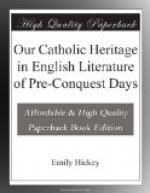In English literature we have some great tellings “under the similitude of a dream.” We have the nineteenth-century “Dream of Gerontius,” our great Cardinal’s drama of the soul in its parting and after. We have the seventeenth-century dream from the darkness of Bedford Gaol, whence John Bunyan saw the pilgrims on their way, through dangers and trials, on to the river that must be crossed before they could come to the Celestial City. We have the fourteenth-century dream of the gaunt, sad-souled William Langley, the dreamer of the Malvern Hills. And, earlier by many a century, we have the dream of the dreamer at the depth of midnight, the midnight whose heart was bright with the splendour of the glorious vesting and gem-adorning of the Cross of Jesus Christ, and dark with the moisture of the Sacred Blood that oozed therefrom.
We have first the simple, quiet prelude.
Lo, I will tell of the best
of dreams, I dreamed at the deep midnight,
When all men lay at rest.
Then comes the description of the Cross in its glory. It is uplift and girt with light, flooded with gold and set with precious gems. This is followed by the seeing through the glory, the seeing of the anguish. The hues are shifted from dark to bright; the light of gold lights it, and yet anon it is wet, defiled with Blood. Here are the two sides of the Passion: the veiled glory, and the illumined anguish: the supreme might, and the absolute weakness: the darkness of the grave, and the light of the Resurrection.
While time shall be, the Cross is to us all the Book where we may read all we choose to read, all God sends us grace to read. Cynewulf chose to read, and with Cynewulf was the grace of God.
The poet lies beholding the wondrous sight: the sight that all God’s fair angels beheld, and all the universe, and men of mortal breath.
The Rood speaks to Cynewulf. To us, with every look upon the Cross, should come, would come, were we alive all through with keen, sweet, spiritual life, the voice telling of the Passion, of the victory, of the glory. Cynewulf heard the Rood tell how long ago it was hewn down, ordained to lift up the evil-doers, to bear the law-breakers.
They bore me on their shoulders
then, on hill they set me high,
And made me fast, a many foes.
Then mankind’s Lord drew nigh,
With Mighty courage hasting
Him to mount on me and die.
Though all earth shook, I
durst not bend or break without His word;
Firm I must stand, nor fall
and crush the gazing foes abhorred.
Then the young Hero dighted
Him: Almighty God was He:
Steadfast and very stout of
heart mounted the shameful tree,
Brave in the sight of many
there, when man He fain would free.
I trembled when He clasped
me round, yet groundward durst not bend,
I must not fall to lap of
earth, but stand fast to the end.
We notice the obedience of the Cross. In its absolute sympathy with its Creator’s agony, its indignation at the horrible crime of His enemies, it would fain have fallen and crushed the gazing foes abhorred. But this was not to be, any more than fire was to come down from heaven at the Boanerges’ call when they were fain to avenge the insult put upon their Master, whom the people of the Samaritan city would not receive (Luke ix, 52, etc.).




